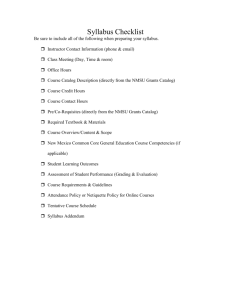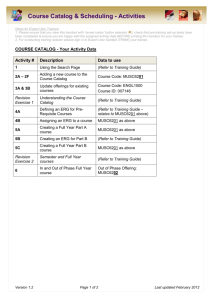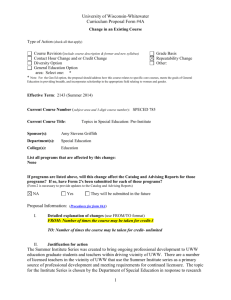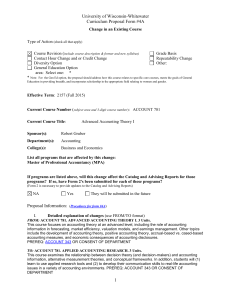COMPSCI 412 Computer Organization and Systems Programming
advertisement
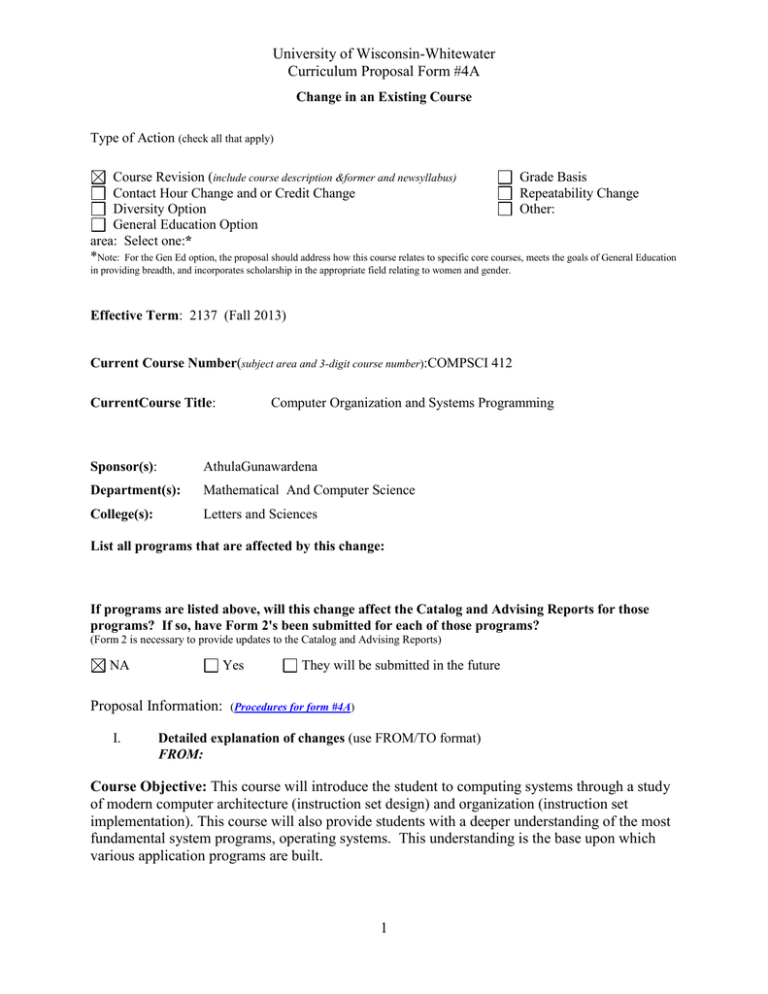
University of Wisconsin-Whitewater Curriculum Proposal Form #4A Change in an Existing Course Type of Action (check all that apply) Course Revision (include course description &former and newsyllabus) Grade Basis Contact Hour Change and or Credit Change Repeatability Change Diversity Option Other: General Education Option area: Select one:* *Note: For the Gen Ed option, the proposal should address how this course relates to specific core courses, meets the goals of General Education in providing breadth, and incorporates scholarship in the appropriate field relating to women and gender. Effective Term: 2137 (Fall 2013) Current Course Number(subject area and 3-digit course number):COMPSCI 412 CurrentCourse Title: Computer Organization and Systems Programming Sponsor(s): AthulaGunawardena Department(s): Mathematical And Computer Science College(s): Letters and Sciences List all programs that are affected by this change: If programs are listed above, will this change affect the Catalog and Advising Reports for those programs? If so, have Form 2's been submitted for each of those programs? (Form 2 is necessary to provide updates to the Catalog and Advising Reports) NA Yes Proposal Information: I. They will be submitted in the future (Procedures for form #4A) Detailed explanation of changes (use FROM/TO format) FROM: Course Objective: This course will introduce the student to computing systems through a study of modern computer architecture (instruction set design) and organization (instruction set implementation). This course will also provide students with a deeper understanding of the most fundamental system programs, operating systems. This understanding is the base upon which various application programs are built. 1 Catalog Description: A study of general computer system organization and architecture.Comparison of CPU and memory structure, instruction formats, addressing, flow of control and operating systems on different types of computer. Assembly language is used extensively to write system programs. Prereq: COMPSCI-271 or consent of instructor Course Content: 1. Computer Systems: A general overview of computer hardware systems, computer buses, storage, input/output control, and classification of computers. 2. Digital Logic: Boolean algebra, logic gates, simple logic circuits, basic hardware components. 3. Mathematical Basis of Computers: Different number systems, computer representation of integers and floating point numbers, arithmetic operations in a binary system. 4. Internal Memory: Cache memory, DRAM organization 5. Input/Output: External devices, I/O modules, interrupt driven I/O, DMA 6. Instruction Sets: Machine instructions 7. Language Translation: Assembly languages, assemblers, interpreters, compilers, linkers and loaders. 8. Operating system structures; user interfaces, process management, process scheduling, interaction of concurrent processes, memory management, device management, and file management. TO: Course Objective: This course will introduce the student to computing systems through a study of modern computer architecture (instruction set design) and organization (instruction set implementation). This course will also provide students with a deeper understanding of the most fundamental system programs, operating systems, and implementation of distributed systems. This understanding is the base upon which various application programs are built. Catalog Description: Introduction to organization of modern digital computers - understanding the various components of a computer and their interrelationships. Study of systems programming in C/Linux. Prereq: COMPSCI-271 or consent of instructor Course Content: 1. Computer Systems: A general overview of computer hardware systems, computer buses, storage, input/output control, and classification of computers. 2. Mathematical Basis of Computers: Different number systems, computer representation of integers and floating point numbers, arithmetic operations in a binary system. 3. Digital Logic: Boolean algebra, logic gates, logic circuits, basic hardware components. 4. Internal Memory: Cache memory, DRAM organization. 5. Input/Output: External devices, I/O modules, interrupt driven I/O, DMA. 6. File I/O / System Calls / Buffering. 7. Processes: Fork / Exec / Dup / Pipe, process management, process scheduling, interaction of concurrent processes. 8. Sockets / Client-Server Programming. 9. Threads. 2 II. Justification for action As recommended by the outside reviewers of the new major in Computer Science, we are consolidating our three Systems Programming courses: CS 271 (Assembly Language Programming), CS 302 (Computer Logic and Microprocessors), and CS 412(Computer Organization and Systems Programming) into two courses: CS 271 and CS 412. CS 412’s syllabus has been adapted to include some content from CS 302 (Digital Logic). More advanced topics (Sockets / Client-Server Programming, Threads) have been added. C/Linux will be used as the programming environment. III. Bibliography 1. Structured Computer Organization (6th Edition) :Andrew S. Tanenbaum and Todd Austin, Prentice Hall , 2012. 2. Computer Organization and Architecture: Designing for Performance (8th Edition) , William Stallings, Prentice Hall, 2009. 3. Modern Operating Systems (3rd Edition) , Andrew S. Tanenbaum, Prentice Hall, 2007. 4. Operating System Concepts, AbrahamSilberschatz, Peter Baer Galvin, and Greg Gagne , Wiley, 2008. 5. Linux System Programming: Talking Directly to the Kernel and C Library (1st edition) : Robert Love, O'Reilly Media, 2007. 3 IV. Syllabus/outline(if course revision, include former syllabus and new syllabus) OLD SYLLABUS COMPSCI-412-01 Computer Organization and Systems Programming Fall 2011 Room: Hyer 210 Time: TR 9:30-10:45am Instructor: Dr. Athula Gunawardena Office: MG110, Phone: 472-1469 E-mail: gunawara@uww.edu Office Hours: : TR 12:00-12:30pm TR 3:30-5:00pm W 4:30-5:30pm or by an appointment Course Objective: This course will introduce the student to computing systems through a study of modern computer architecture (instruction set design) and organization (instruction set implementation). This course will also provide students with a deeper understanding of the most fundamental system programs, operating systems. This understanding is the base upon which various application programs are built. Catalog Description: A study of general computer system organization and architecture. Comparison of CPU and memory structure, instruction formats, addressing, flow of control and operating systems on different types of computer. Assembly language is used extensively to write system programs. Prereq: COMPSCI-271 or cons instr. Text: No text has been assigned. Grading Policy: Assignments Mid-term Exam Final Exam (Comprehensive) 35% 30% 35% A: 94-100%, A-:90-93% B+ : 87-89%, B: 84-86%, B-: 80-83% C+ : 77-79%, C: 74-76%, C-: 70-73% D+ : 67-69%, D: 64-66%, D-: 60-63%, F < 60% Course Content: 1. Computer Systems: A general overview of computer hardware systems, computer buses, storage, input/output control, and classification of computers. 2. Digital Logic: Boolean algebra, logic gates, simple logic circuits, basic hardware components. 4 3. Mathematical Basis of Computers: Different number systems, computer representation of integers and floating point numbers, arithmetic operations in a binary system. 4. Internal Memory: Cache memory, DRAM organization 5. Input/Output: External devices, I/O modules, interrupt driven I/O, DMA 6. Instruction Sets: Machine instructions 7. Language Translation: Assembly languages, assemblers, interpreters, compilers, linkers and loaders. 8. Operating system structures; user interfaces, process management, process scheduling, interaction of concurrent processes, memory management, device management, and file management. Course Requirements: 1. CLASS ATTENDANCE: Students are expected to attend all classes. 2. ASSIGNMENTS/PROGRAMS: All assignments are due at the BEGINNING of the class period on the assigned date. Late aissgnments will be docked 20% per class day. ACADEMIC MISCONDUCT: The University believes that academic honesty and integrity are fundamental to the mission of higher education and of the University of Wisconsin System. The University has a responsibility to promote academic honesty and integrity and to develop procedures to deal effectively with instances of academic dishonesty. Students are responsible for the honest completion and representation of their work, for the appropriate citation of sources, and for respect of others' academic endeavors. Students who violate these standards are subject to disciplinary action. UWS Chapter 14 identifies procedures to be followed when a student is accused of academic misconduct. For additional information, please refer to the section in the Student Handbook titled, “Student Academic Disciplinary Procedures.” ABSENCE FOR UNIVERSITY EVENTS: University policy adopted by the Faculty Senate and the Whitewater Student Government states that students will not be academically penalized for missing class in order to participate in university sanctioned events. They will be provided an opportunity to make up any work that is missed; and if class attendance is a requirement, missing a class in order to participate in a university sanctioned event will not be counted as an absence. A university sanctioned event is defined to be any intercollegiate athletic contest or other such event as determined by the Provost. Activity sponsors are responsible for obtaining the Provost's prior approval of an event as being university sanctioned and for providing an official list of participants. Students are responsible for notifying their instructors in advance of their participation in such events. RELIGIOUS BELIEFS: Board of Regents policy states that students' sincerely held religious beliefs shall be reasonably accommodated with respect to scheduling all examinations and other academic requirements. Students must notify the instructor, within the first three weeks of the beginning of classes (within the first week of summer session and short courses) of the specific days or dates on which they will request accommodation from an examination or academic requirement. For additional information, please refer to the section in the University Bulletin and the Timetable titled “Accommodation of Religious Beliefs”. 5 NEW SYLLABUS COMPSCI-412 Computer Organization and Systems Programming Course Objective: This course will introduce the student to computing systems through a study of modern computer architecture (instruction set design) and organization (instruction set implementation). This course will also provide students with a deeper understanding of the most fundamental system programs, operating systems, and implementation of distributed systems. This understanding is the base upon which various application programs are built. Catalog Description: Introduction to organization of modern digital computers - understanding the various components of a computer and their interrelationships. Study of systems programming in C/Linux. Prereq: COMPSCI-271 or cons instr. Text: Structured Computer Organization (6th Edition) by Andrew S. Tanenbaum and Todd Austin Linux System Programming: Talking Directly to the Kernel and C Library by Robert Love Grading Policy: Assignments Mid-term Exam Final Exam (Comprehensive) 35% 30% 35% A: 94-100%, A-:90-93% B+ : 87-89%, B: 84-86%, B-: 80-83% C+ : 77-79%, C: 74-76%, C-: 70-73%, D+ : 67-69%, D: 64-66%, D-: 60-63%, F < 60% Course Content: 1. Computer Systems: A general overview of computer hardware systems, computer buses, storage, input/output control, and classification of computers. (Week 1) 2. Mathematical Basis of Computers: Different number systems, computer representation of integers and floating point numbers, arithmetic operations in a binary system. (Week 2) 3. Digital Logic: Boolean algebra, logic gates, logic circuits, basic hardware components. (Weeks 3-5)) 4. Internal Memory: Cache memory, DRAM organization. (Week 6) 5. Input/Output: External devices, I/O modules, interrupt driven I/O, DMA. (Week 7) 6. File I/O / System Calls / Buffering. (Week 8) 7. Processes: Fork / Exec / Dup / Pipe, process management, process scheduling, interaction of concurrent processes. (Weeks 9-12) 8. Sockets / Client-Server Programming (Weeks 13, 14) 9. Threads (Week 15) 6 Course Requirements: 1. CLASS ATTENDANCE: Students are expected to attend all classes. 2. ASSIGNMENTS/PROGRAMS: All assignments are due at the BEGINNING of the class period on the assigned date. Late aissgnments will be docked 20% per class day. ACADEMIC MISCONDUCT: The University believes that academic honesty and integrity are fundamental to the mission of higher education and of the University of Wisconsin System. The University has a responsibility to promote academic honesty and integrity and to develop procedures to deal effectively with instances of academic dishonesty. Students are responsible for the honest completion and representation of their work, for the appropriate citation of sources, and for respect of others' academic endeavors. Students who violate these standards are subject to disciplinary action. UWS Chapter 14 identifies procedures to be followed when a student is accused of academic misconduct. For additional information, please refer to the section in the Student Handbook titled, “Student Academic Disciplinary Procedures.” ABSENCE FOR UNIVERSITY EVENTS: University policy adopted by the Faculty Senate and the Whitewater Student Government states that students will not be academically penalized for missing class in order to participate in university sanctioned events. They will be provided an opportunity to make up any work that is missed; and if class attendance is a requirement, missing a class in order to participate in a university sanctioned event will not be counted as an absence. A university sanctioned event is defined to be any intercollegiate athletic contest or other such event as determined by the Provost. Activity sponsors are responsible for obtaining the Provost's prior approval of an event as being university sanctioned and for providing an official list of participants. Students are responsible for notifying their instructors in advance of their participation in such events. RELIGIOUS BELIEFS: Board of Regents policy states that students' sincerely held religious beliefs shall be reasonably accommodated with respect to scheduling all examinations and other academic requirements. Students must notify the instructor, within the first three weeks of the beginning of classes (within the first week of summer session and short courses) of the specific days or dates on which they will request accommodation from an examination or academic requirement. For additional information, please refer to the section in the University Bulletin and the Timetable titled “Accommodation of Religious Beliefs”. 7
